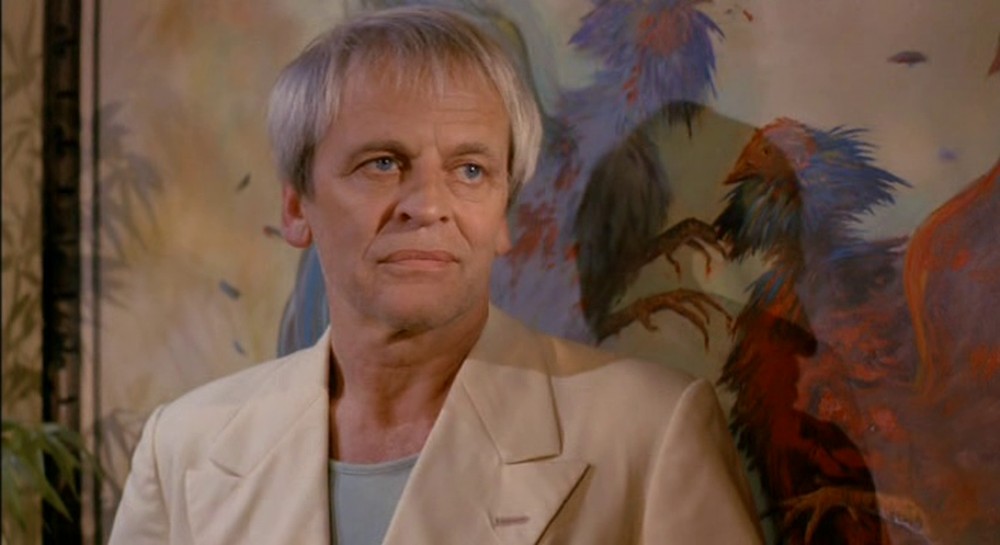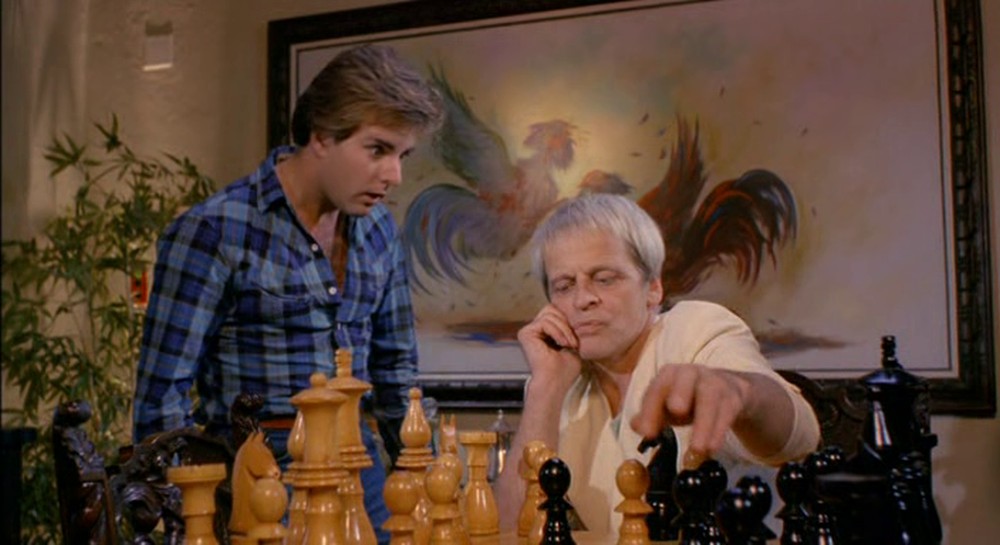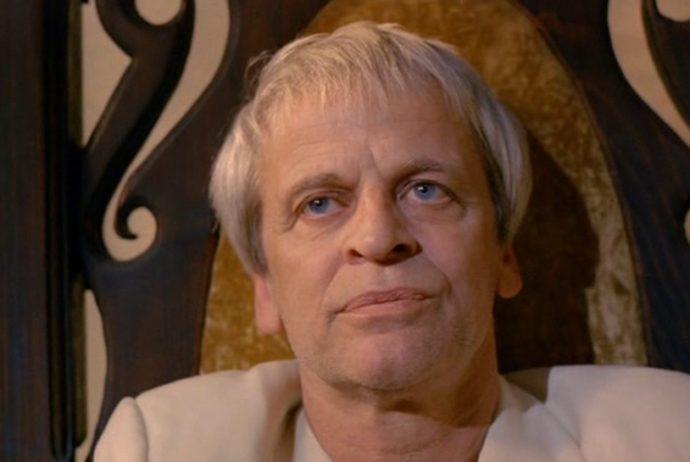Dir: Ulli Lommel
Star: Suzanna Love, Barry Hickey, Ulli Lommel, Klaus Kinski
Is this the worst film in Klaus Kinski’s long filmography, spanning forty years? There’s certainly a case to be made for that, not least that of all his feature credits listed in the IMDb, the 2.6 rating for this movie is ranked 137th out of 137. And it’s not even close, with the next lowest a relatively respectable 3.0. Director Lommel made his name in the low-budget horror field, in particular for The Boogeyman, a 1980 slasher also starring Love, which gained some notoriety for being officially declared a “video nasty” in the UK a few years later. Like most such movies, it’s hardly worth the tape on which it was recorded, by most accounts. Certainly, on the basis of Stars, Lommel fully deserves his reputation as a talentless hack, managing the admirable feat of making a “comedy” without any actual laughs.
Oh, it’s clearly intended as a breezy fantasy adventure of the type popular in the mid-eighties. A naive young man, Gene Macbride (Hickey), inherits a SE Asian plantation after the sudden demise of his uncle, Donald (Kinski). He travels to his new property, only to find a curse operating due to the theft of three special rubies, held sacred by the local tribesmen. With the help of Kelly (Love), he has to recover the stolen jewels, while fending off both the curse and those who have their own agenda. Oh, yeah. Donald returns from beyond the grave to provide words of advice for his nephew. Just the once though, for Klaus was only hired for two days’ work. shooting in Mexico. He made out, getting $75,000 for his work – contrast Hickey, who earned $1,200 for four months. However, he had been doing singing telegrams in Los Angeles before the audition.

The film is flat-out terrible. You feel like it’s trying to be a spoof of things like the previous year’s The Jewel of the Nile, except Lommel failed to realize that Jewel was never intended to be taken seriously to begin with. It’s the only way to explain things like the Euro-pudding of accents which infect the film, or dialogue which is clearly intended to be funny, yet every attempt simply lands with a leaden thump. For example, Gene’s reaction on hearing about the death of his relative: “He gave me my first tom-tom, when I was six years old!” Maybe that line had them rolling in the aisles in Lommel’s native Germany? It’s not helped by Hickey’s delivery. His performance is most at home in the tropical jungles, because it’s so wooden, it could easily be mistaken for mahogany. Gene barely reacts to anything, going through the entire movie as if in a trance.
The story-line is mind-numbingly dull as well, plodding from one ruby retrieval to the next, interrupted by minor characters – never anyone of genuine significance – being bumped off by the curse, in ways that are more laughable than terrifying. For example, a maid is supposedly killed by insects, though the execution makes it feel more like she was stalked and murdered by a cheap eighties synthesizer. It is truly a case that the film only comes alive when Klaus is on-screen, and that’s not very much. Indeed, it’s hardly an exaggeration that the (very nicely painted) portrait of Donald McBride gets almost as much screen-time. Kinski has two scenes: his death in a fight over a chessboard with a minion, and his spectral appearance to Gene, spouting nonsensical lines such as, “Most Americans think of Asian countries as… sort of house pets. But they are not kittens or puppies… They’re elephants.”
Given the movie itself is so thoroughly forgettable, it’s fortunate that the making of the film, and Klaus’s part in it, is a source of many anecdotes. There are a few main sources for these. Firstly, there’s an interview with director Lommel, included as an extra on the DVD release, and embedded in full below. I’m working on a full transcript of that, which I’ll add in the Kinskilaneous section when it’s completed. There are also interviews with Hickey on Du Dumme Sau and Exploitation Retrospect, as well as comments from Joycelyne Lew, who played the maid mentioned above. What follows are some of the most interesting and/or amusing quotes by the three, forming a brief oral history of Revenge of the Stolen Stars, in particular as it pertains to Kinski.

He wasn’t the original choice for the part. It was going to be Tony Curtis, but he checked himself into rehab, leading to a quick scramble for a replacement. Ernest Borgnine passed, and then word reached the director that Klaus was available. Lommel: I didn’t want to work with Klaus Kinski, because he had such a bad reputation, and I didn’t want to have to put up with somebody crazy on my set like him. But then his agent said, “Don’t worry, he has completely changed, he has mellowed he’s a different person.”I didn’t trust that, so I said, “Well, let me meet him,” and I met him at the Chateau Marmont Hotel on the Sunset Strip. And he was so nice, so sweet and so gentle, and I said. “Wow! You know, maybe he has changed,” and so we started shooting with him in Mexico.
Lew: We traveled in a town car and [Kiaus] had his hand on my lap. When we arrived at the hotel, I asked where my luggage was. It seems Mr. Kinski had it delivered to his room. I found the director and asked him to put me in a room far down the hall. and to not tell anyone where I was. I pretty much hid all night in my room and the next morning he asked what happened to me. I said, “Well, I was around.…”
As soon as they began filming, Klaus began making demands. He couldn’t act with all the lights shining in his face, even though they were perfectly normal movie equipment. Then, when that was fixed, the boom microphone became a distraction: that’s why the audio is so inconsistent during the scene, because of Kinski’s demands. Lommel: I knew we were in big trouble after the first take… We needed to shoot this from another angle, and I said to him, “Okay, Klaus – you have to sit down there again in the chair,” and I have all the cameras taking from a different angle now.” Oh,” he said, “I don’t want to sit down there again!” In the end, Lommel decided, rather than keep fighting Kinski over every element, just to make his character a ghost so that it didn’t matter if he went from sitting to walking to playing chess.

Klaus loved the idea, calling Lommel a “genius” for it. But Kinski’s wholesale adoption of his new spectral persona caused problems for the actor with whom he was supposed to interact. Hickey: Ulli comes over to me and says, “Barry, you have to leave the room.” “Why?” “Because you can’t see Klaus.” And he’s buying into this, he’s explaining to me Klaus’ logic. “Because Klaus is a ghost. “Yeah, I know, he’s my uncle.” “But you can’t see him and if you see him now it’ll destroy his performance.” “Help me out here Ulli. This is my comedic, fun-loving Irish uncle, now he’s a crazy German who whispers?” “That’s what he wants and that’s how he acts. I’m paying him all this money Barry.”
Lommel: Towards the end of the day, we’d shot already maybe 12-13 hours. He comes to me and says, “I’m feeling really good now,” and I say, “Well, that’s fine, Klaus.” I saw though that he’d finished one bottle after the other, of whiskey and champagne and vodka and cognac… He said, “I can’t stop right now, I need to continue, I’m just beginning to feel it… No, I need to continue! I can’t go home, you can’t have me tomorrow! Tonight! I want to shoot tonight.” So I went to everybody, I said, “Look, maybe we should just get it over with. We’ll shoot all the scenes with him until he’s done and then we never have to put up with him again,. We’ll take off tomorrow and if necessary the next day.” So we kept shooting and shooting and shooting, and he got more and more drunk. I think after about almost 30 hours of non-stop shooting with him, he just dropped dead.
There was, however, at least something of a happy ending to the tale. Lommel: I was really glad that it was over, because he was such a pain in the ass. Then we took two days off, and on the second day off, I was at the beach in Mexico and he came to me and said. “I just want to tell you, you know, it was really great working with you, and you have so much imagination.” And I said, “Well, thanks, Klaus. That’s kind of you.”
